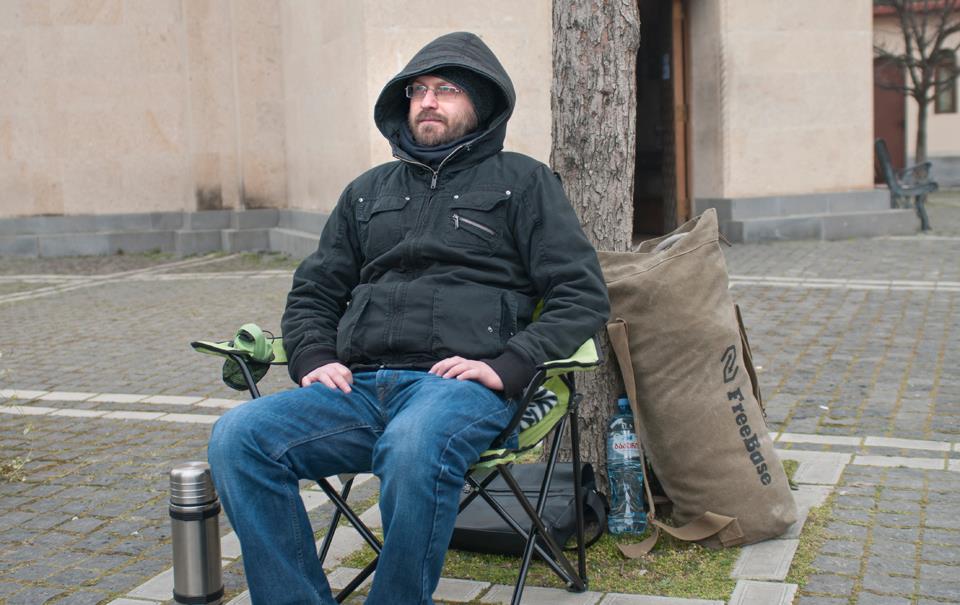
A former employee of the Georgian Justice Ministry has gone on hunger strike after the ministry failed to rehire him despite the courts ruling he must be given back his job.
Tamaz Akhobadze was fired from the ministry’s Crime Prevention Centre in 2014 along with a former colleague, Ana Subeliani. The two claimed their dismissal was politically motivated and appealed to the courts.
After winning their case in the Court of Appeals in 2017, the Justice Ministry was ordered to rehire the two and compensate them for lost earnings, but it has so far refused to do so.
The centre said they could not rehire Akhobadze but was willing to pay him the compensation, which Akhobadze said was not enough.
‘No connection with the quality of their work’
In 2014, Akhobadze was working as a programme manager at the Crime Prevention Centre. That year, he was told that the company was hiring a Georgian Dream activist to work under him.
‘I did not need additional staff. Besides, you can’t hire people just like that in the public sector; an open call must be made. The person they proposed didn’t have any experience and this led to a conflict’, Akhobadze told OC Media.
Both he and Subeliani were told they were being let go because of a ‘reorganisation’ at the centre. They took the case to court and won in both the City Court and, following an appeal by the ministry, in the Court of Appeals. A cassation complaint by the Justice Ministry was rejected by the Supreme Court.
Despite the win, the two employees were not rehired by the centre. The ministry then filed another complaint to the Supreme Court claiming the position Akhobadze formerly held was now occupied, but this appeal was also rejected, in July 2018.
The court’s ruling said that both complainants had been fired because of the subjective attitudes of their employers, which they said had no connection with the quality of their work or their qualifications. The court found that the reorganisation at the centre was used as a formal excuse to dismiss them.
Subeliani, who did not request to be rehired, was paid ₾74,250 ($28,000) by the ministry in compensation.
‘The execution is being hindered’
Akhobadze met with Deputy Justice Minister Mikheil Sarjveladze on 27 February, but after negotiations were unsuccessful, he began his hunger strike.
Akhobadze gave the Ministry three options: to rehire him and compensate him for lost earnings, to compensate him both for lost earnings and for not rehiring him, or to compensate him for lost earnings and publicly apologise to violating his rights. None were approved by the ministry.
‘I’m very principled regarding the execution of the court order, but I’m also ready to make concessions — they can rehire me in a similar position if the one I used to hold is occupied’, Akhobadze told OC Media.
The Georgian Young Lawyers Association (GYLA), a local rights group that worked on Akhobadze’s case, issued a statement on 28 February calling on the Prosecutor’s Office to look into the execution of the court’s order.
Shorena Loladze, a lawyer at GYLA, told OC Media that generally, the term allotted for execution is 10 years, but in this case, it should have occurred instantly.
‘We addressed the Execution Bureau in 2017 and now it’s already the second year that we have not seen results. Ten years is a general term in which we could address the execution, but this doesn’t mean it must take 10 years to execute. Because Akhobadze addressed them, they should start execution’, Loladze said.
She said they were considering filing the case to the European Court of Human Rights and have already addressed the Prosecutor’s Office to inquire whether the execution was being deliberately hindered.
‘In our statement, we indicated the circumstances that we think shows that the execution is being hindered, which is a crime. This may lead to an investigation’, Loladze added.
Justice Minister Tea Tsulukiani addressed the issue back in June 2018 after she was asked about it in Parliament. She said that the ministry was not delaying the execution, but invited both Akhobadze and Subeliani to the Execution Bureau.
‘When we invited them, they started negotiating about money’, Tsulukiani said.
Akhobadze, who was present in parliament at the time, loudly criticised Tsulukiani’s comment, for which he was escorted from the room.
‘Instrumentalised by political powers’
In the evening of 28 February, Akhobadze set up a tent in front of the Justice Ministry. Following this, the National Execution Bureau released a statement saying that Akhobadze had been demanding the person who currently occupies his former position be fired.
The bureau noted that the court’s ruling did not order such action from the ministry.
According to the Bureau, Akhobadze would be compensated with the money required by the court ruling even if he did not wish to receive it. They said he would also be hired by the Crime Prevention Centre as a manager of their youth programmes.
‘Taking the situation into consideration, the Crime Prevention Centre and the Execution Bureau think that all the resources for a legal or rational debate with the concerned party have been exhausted. On top of this, there is a real danger that Akhobadze, who is upset, could be instrumentalised by various political powers’, said the statement.




 28 February 2019
28 February 2019


